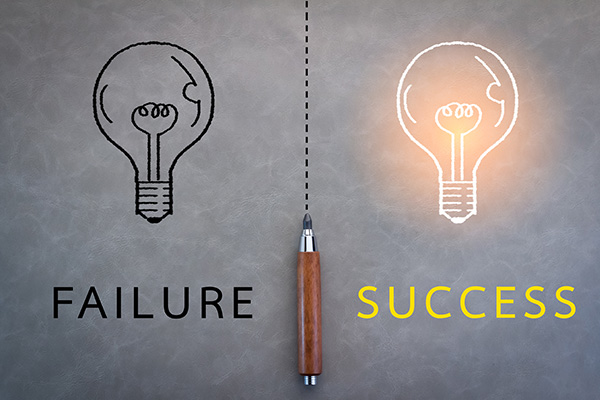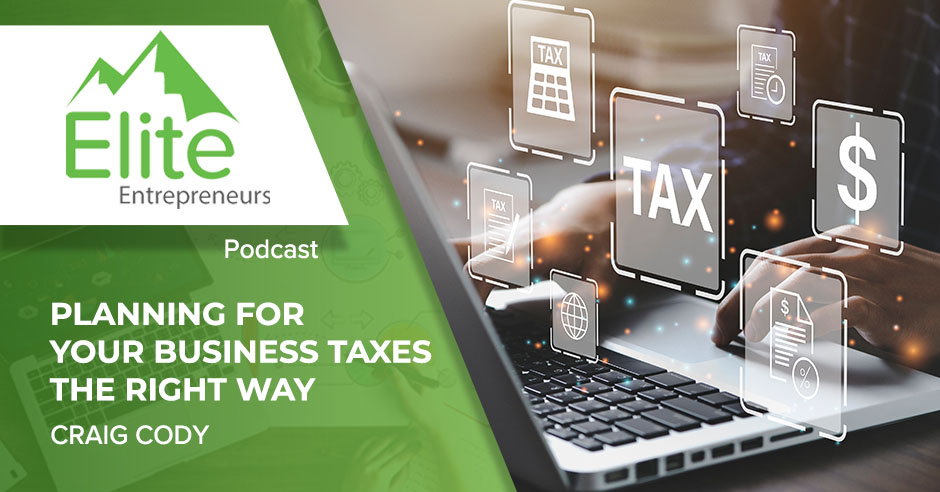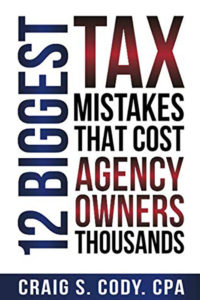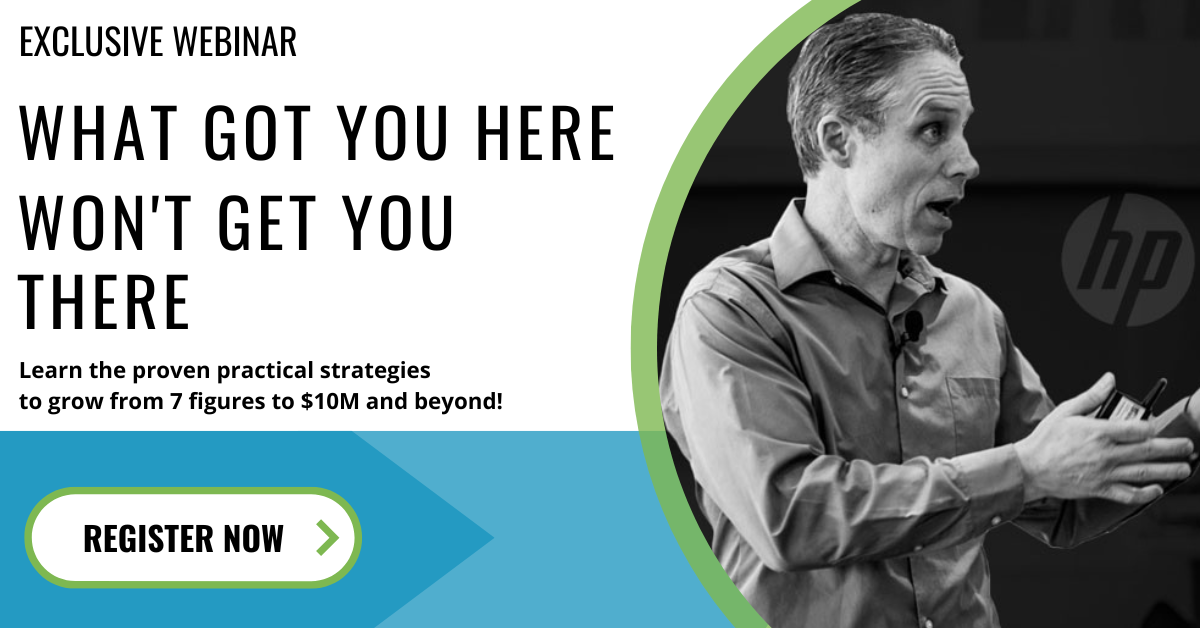Episode 13: Planning For Your Business Taxes The Right Way, With Craig Cody
Craig Cody is a Certified Public Accountant, Certified Tax Coach™, business owner and the host of The Progressive Dentist Podcast. Prior to his current work, Craig spent seventeen years with the NYPD, where he retired as a Lieutenant in September 2000. Craig is an expert in helping his clients legally reduce their tax liabilities and keep more of their money. Through his podcast, Craig helps dentists grow their practices through smart financial decisions and through financial education of the kind that isn’t offered in dental school.
What the podcast will teach you:
- Why it is crucial to take the time to think about ways your business can save money, and why monthly check-ins with your CPA can help you identify opportunities
- What low-hanging fruit business owners can pursue to get back more of what they make, and why the type of business entity your company falls under matters
- What tax breaks, write offs and opportunities business owners should speak with their CPAs about taking advantage of
- Why planning for your taxes should be a year-round process and not something you start thinking about when it’s time to file
- How to connect with Craig Cody and get a free copy of his book The 10 Biggest Tax Mistakes that Cost Business Owners Thousands
- Why using the home athletic facility deduction to write off a swimming pool and having the owners hire their kids are two of Craig’s favorite ways to save money for his clients
- Why hiring a great CPA should be viewed as an income source rather than as a financial expense due to the return on investment
- Why having the right retirement plan for exiting from your business is a critical step you should be thinking about now
- How a few tweaks to one of Craig’s client’s taxes saved the client more than $450,000 in one year
Resources:
- Website: theprogressivedentist.com
- Website: https://craigcodyandcompany.com/eliteentrepreneurs/
- Email: craig@ccodycpa.com
- Twitter: @CraigC2742
- LinkedIn: https://www.linkedin.com/in/craigcodycpa
- Secrets of a Tax Free Life co-authored by Craig Cody: https://amzn.to/2DU1eYd
- The 12 Biggest Tax Mistakes that Cost Dentists Thousands by Craig Cody: https://amzn.to/2DIjnYL
—
I’m super excited to welcome our special guest, Craig Cody. He grew up in Long Island, New York, and spent a lot of time in the New York City Police Department and retired as a Lieutenant in September 2000. Thank you for your service. That’s quite an accomplishment. Craig had the opportunity to pursue an interest in the financial industry and joined an international CPA firm. He then went on to start up his own firm.
His company name is Craig Cody & Company. He is a certified public accountant and more importantly, he’s a certified tax coach. That’ll be important to us in our conversation in this episode. Craig has spent a lot of time over the last several years helping people save a ton of money on their taxes and I don’t mean individuals. I mean business owners, specifically. I’m excited to have him come on. He co-authored a book, an Amazon bestseller called Secrets of a Tax-Free Life. In addition to tax planning, his practice offers traditional tax services as well as offsite CFO services. I’m super excited to have him as our guest on the show. Thank you for joining us, Craig.
Thank you very much for having me. I’m psyched to be here.
What similarities are there between life in the New York City Police Department and helping people with their taxes? Give me some similarities there.
The thrill of chasing a perp down the streets of New York City and capturing is a pretty good adrenaline high, but when you save somebody $50,000 or $60,000 in taxes a year, that’s a pretty good high too. I consider that a similarity. The other thing is all that time in the police department, one thing you learn to do is you learn to talk to people and communicate with people across all different cultures, economic groups and so on. Being a CPA has helped me be able to communicate with clients. We’re probably not the best communicators. We have our pocket protectors and pencils, but we probably could do a better job communicating with our clients, which has helped me a lot.
Your bio says you followed on the heels of your father, who retired after 33 years of service and you served for seventeen years.
Yes and my son just had his anniversary and he’s a New York City Police Sergeant.
It’s in the family.
As my wife says, it’s in the blood.
Let’s talk about your life now. My readers are probably saying, “Let’s go to some of the coolest stories from your time on the streets. I’m sure you tell lots of great stories about that, but we’re here to help people save money on their taxes, which I know they’re equally excited about, if not more. They’re probably more excited about that for themselves now.
You have to keep more of what you make. Share on XAs you know, our audience is full of seven-figure business owners. These are entrepreneurs who figured out how to will their company forward. All the grit, tenacity and hard struggles to start something and grow it to a steady operation where they pass that million dollar mark, now, they’re a seven-figure business and there are new challenges. One of those is figuring out how to minimize that check every year to the taxman.
To keep more of what you make. It’s only a small percentage. I wish I could remember what that number is that makes it to $1 million in revenue.
It is a small percentage, so I’m glad you’re bringing that up. We talk about it all the time. Depending on the source of information, it can be anywhere from 3% to 7%. We think it’s more like 3% or 4% if you consider all the businesses Uncle Sam doesn’t know about. There are plenty of those. It’s a lot. Of all the businesses that ever start, relatively few ever make it to a million. We are both on the same page there. We want to help them keep more of their money. Where do we start in this journey of helping our readers learn where they can go to figure out how to keep more of their hard-earned money?
I’ve written a couple of books. One of them was The 10 Biggest Tax Mistakes that Cost Business Owners Thousands. The biggest mistake is failing to plan. We go on vacation. We do research on where we’re going to go and what we’re going to do. When we’re buying a car, we’re doing research into vehicles. When we run our business, we typically don’t take the time to plan and see how we can save money. We do a lot of planning, especially if we’re hitting a million on what we could do to hit that revenue number, but what can we do to save? The biggest mistake is taking some time to speak with your CPA. You should be doing it on a regular basis and when talking about regular, I’m talking about monthly. Make sure you’re taking advantage of everything that’s out there.
As a CPA who works with a lot of business owners like this, you talk about meeting monthly with the client as an ideal frequency. How much time would be focused on checking in with the CPA on a monthly basis to make sure we’ve got a plan and then we’re sticking to it?
I would say our typical call runs anywhere from 15 minutes to 45 minutes a month and we do it via Zoom. It might be during lunch typically unless we have something that we want to wrap our hands around. It’s a pretty light meeting. We go over the numbers. We look at the P&L. We look at our expenses and where things fall in. Are they comparative to where they should be? Where might we be overspending and are we taking advantage of the things that we talked about when we did our initial plan?
It sounds like the way that you approach this is this isn’t just basic bookkeeping services you’re doing with your clients. You’re talking through the financials. Some of the part-time CFO or offsite CFO services that you provide are probably super valuable for your clients.
Even if it’s not that. If it’s just your regular monthly client that we’re working with, take the time to go over the numbers and know where you are. Sometimes people don’t realize, “I’m spending all this money on that,” because they’re very busy working in a business that they may not be looking at the business.
That’s a typical thing where they’re stuck inside of the business. They can’t get that view of where the money’s going. You mentioned another book that you wrote, but one of them is The Secrets of a Tax-Free Life. What are some of the low-hanging fruit for most business owners that you deal with?
Here is a big one. It’s picking the wrong business entity, operating out of the wrong, whether it’s a corporation, an S corporation or an LLC and what planning went into choosing that entity. Typically it’s, “My attorney said for liability purposes, I should be an S corporation or I should be an LLC,” and there was no integration of the CPA in that conversation. That’s a big one.

Business Taxes: One thing you learn to do is you learn to talk to people and communicate with people across all different cultures and economic groups. Being a CPA has definitely helped people communicate with clients effectively.
Another one is based on the new tax law. There’s something called qualified business income Section 199, a 20% deduction. How a specified service business where your income is limited where you could get the deduction or you are a qualified business where that 20% could be unlimited and what do you need to do to make sure you maximize taking advantage of that 20% deduction. Me and you can have the same business and the same net income and I might get a $50,000 deduction, but you might get a $200,000 deduction because you did planning I did not.
That’s a pretty big swing.
It sure is.
The type of business structure itself or what business entity form is super important. Also, working with somebody who knows all of the things that are out there and how to best navigate the system to your favor.
We all know how to do it. It’s just, “Are we taking the time to communicate that with our clients?” There’s nothing here that’s rocket science. It’s just taking the time and looking at things from a different perspective.
What would you give as advice to somebody who is already working with the CPA they know and trust? We only want to open their eyes and maybe help arm some of our listeners to go ask their CPA about certain things.
Here are some. Are we taking advantage of the home office deduction? Because most of us probably work at least fifteen hours a week from home. If we have a home office, are we taking advantage of the home athletic facility, which could be a pool or our home gym, so we can get to write that off? That could turn into a lot of money. Are we hiring our kids if they’re old enough? The Tax Court says you could hire your kids as young as seven years old. If you have a fifteen-year-old and you’re paying them $12,000 a year, that’s $12,000 that he won’t pay tax on and you won’t pay tax on.
Those are all great ideas and I’m sure we could spend most of the time just outlining simple ideas like that, right?
Correct and take the time. Do we have the retirement plan set up? Do we have the right retirement plan? Many times I’ll see people who buy a business and when you buy a business, you’re typically buying the assets of the business. Are we depreciating things correctly? When you bought that business, did you get some goodwill or are you amortizing that goodwill? It’s amazing how many times we see people don’t amortize that because they’re not talking with their CPA regularly. By the time they have that conversation, it’s March or April and he’s got his head or she’s got her head buried in the books because she’s trying to get stuff out the door. It comes down to making sure you’re communicating all year round because there’s a lot of stuff you can do.
I love that you went right to the very practical monthly check-ins with your CPA, your financial and planning partner. If we’re not doing those now, obviously, we can go to that. Are there other meeting rhythm types of suggestions you would make to somebody if they’re now thinking, “I’m listening to Craig and I finally need to take that step of working with somebody who can help me with this and not a part-time bookkeeper helping me to enter expenses and pay bills?” How would they approach this? Tax time is going to come up here before we know it. We can file extensions and all the rest, but what would you do for somebody who’s only starting now to think, “I need to get some help with planning?”
Make sure you're taking advantage of everything that's out there. Share on XThis is prime tax season before the end of the year to take care of the things that you didn’t take care of. Most CPAs are very good at putting the right numbers in the right boxes, but there’s no planning. Ask that person, “What can I do to save some taxes? What am I doing that I could maybe do a little bit differently and take advantage of the tax code?” This is not a gray area. This is all legitimate stuff that the court says you’re allowed to do.
Sometimes you have to ask and hopefully, the response is not, “Okay. You need to make this payment by January 15th,” because that’s not tax planning. That’s telling you how much you need to pay. A lot of times, when we talk about tax planning, that’s what people think. What we’re talking about is, “You may need to make this payment by January 15th, so you are covered as far as taxes go,” but it’s, “What can we do to save taxes? What can we do a little bit differently?
At least you’re helping me to see the distinction there between planning the payment schedule and planning the savings schedule. It’s different. We didn’t talk about this yet, but who do you serve, primarily your target, in case any of our readers are like, “I like the way Craig’s thinking and talking about this.” If I want to work with Craig, what does that like? Do you serve anybody in the nation? Is it certain areas that you serve?
We are in New York. We have clients as far away as Oregon, so across the nation. The computer and the internet and wonderful things. We work with business owners. We have a niche where we deal with a lot of medical practices, dentists and stuff like that, but they’re like any other business owners. They have the same problems and issues. We work with business owners to help them keep more of what they’re making. It’s easy to say, “I want to make more money. I want to keep more. I need to generate this much more revenue,” but if your revenue has plateaued, how do we keep more of that? That’s what real tax planning is about. It’s keeping more of the money you’re currently making.
You have this expertise in medical practice and dentists, but I think the point is well taken that you can serve any business. You just happen to have a lot of those types of customers right now. You’re serving people across the country. Anybody who’s interested in knowing more about this could certainly reach out to you. What is the best way for them to do that?
They could go to our website. It’s CraigCodyAndCompany.com/eliteentrepreneurs. They could request a free copy of our book, The 10 Biggest Tax Mistakes that Cost Business Owners Thousands.
Thank you. That’s a generous offer.
We will mail them a free paper copy of that. They could also reach us via email at Craig@CCodyCPA.com. Get a copy of the book and check it out. There are a lot of ideas to save you taxes. Call us or go to your CPA and say, “What can I do? How can I do this?”
You already shared a few low-hanging fruit ideas for saving taxes, but if you don’t mind sharing, what is one of your favorite ones that most people had no idea about that you’re like, “This gets them every time.”
The best one is the home athletic facility and pool you may put in your backyard. You could write that pool off. That’s one of my favorites. Also, hiring your kids is another one. Depending on your kids’ ages and how many you have. If you have three kids at $12,000 a pop, you can save tax on $36,000, which is a lot of money. That was my chapter in the first book that was the Amazon bestseller. It was basically, “How to make your child’s cleats tax deductible?” You pay your kid. You make sure the money goes into that bank account and then from there, they pay for their boots and stuff like that. You’d turned the non-deductible expense into a deductible expense and it adds up.
What other things should people be looking for in a CPA? Because I guarantee you, most of the business owners I talk with are or that we serve, they don’t have a y solid CPA. They usually start out with a part-time bookkeeper. We’re talking to somebody who has some knowledge of accounting, but they’re not working with a strategic partner and a CPA. Now, we’re telling them, “It’s worth the money and then some because you’re going to save more than you’re going to pay out for those services,” otherwise, why do it? What should they look for in a great financial partner?
The number one is somebody that is going to communicate with them on a regular basis. Also, somebody that’s looking at things from a tax planning perspective. The compliance part is the easy part. It’s the, “What can we do a little bit differently that no one wants to look at?”
My experience may be limited in this area, but it seems to me that most of us are looking to check the compliance box, especially as things get a little more complicated in our business or our personal finance life. We go, “We need somebody to help make sense of all this and check the compliance box.” I don’t think most of us start out thinking, “I need to find a partner who can help me think through ways to keep more of my money.”
You’re 100% correct and I think people look at it as an expense item versus an income item. People look at it, “It’s going to cost me X amount of dollars.” The real way to look at it is, “It’s going to make me X amount of dollars because if I work with somebody and they’re good, they’re going to save me so much in taxes that I’m going to make money versus lose money.”
That’s so fascinating because you’re right. Many of us as business owners are thinking about this as a necessary evil. “I got to deal with this,” and you’re saying to turn that around. It’s not going to be a new income stream, but it’s going to keep more of what you earned in the first place and the return is there if you have somebody who knows what they’re doing.
I look at that return on investment when we do a tax plan is, “What’s it cost you and how much did you save?”
In your own practice, do you provide some sort of a return on investment estimate when you’re working with a prospective new client? How do you do that?
The first process before we even work with somebody is we have a conversation with them and we analyze their prior year’s tax returns and their P&L. We do an analysis for them and that’s when we come up with what we think their ROI on a tax plan would be. A typical tax plan ROI in the first year is somewhere between 4 and 10 times.
That’s pretty significant.
If your broker came to you with a guarantee, “I’ll make you four times your investment in year one,” we’d probably jump at it.
Most CPAs are very good at putting the right numbers in the right boxes, but there's no planning, Share on XWe’re all jumping at that on the investment side, but we don’t see accounting as an investment usually. It’s not if we say it that way, but if we talk about tax planning, then it can become this return on investment conversation.
We joke because we talk about what I call over-depreciated Frank. He’s the CPA who is very good at putting the right numbers in the right boxes, but it stops there. You want to do more than just put those numbers in the right boxes. You want to have good numbers, but you also want to look for ways to legally reduce the amount of tax you’re paying.
That’s also another concern that many people have. There are ways that you can legally do this, but many of us are concerned about how up and up is this. Can we take that home deduction or that pool as an athletic facility sort of deduction? We might be afraid of dealing with harsh penalties if we are doing something we shouldn’t and we don’t want to venture out into unknown territory. How do you, how do you help business owners think about or see that differently if they have some of these concerns?
Once again, it comes back to those monthly calls and we make sure that the client is documenting everything that they’re doing.
The communication isn’t just so that you can review some numbers together. It’s also making sure that from a compliance standpoint, we’re tracking everything that needs to be tracked to make sure that our plan is going to work.
Correct. “Have you done this? Do we still need to do this? Did you fill this out? Send this back to us so we can put it in the file.” When you paid your kids, did you do it legitimately or did you just write them a $12,000 check at the end of the year? That doesn’t work. You have to do it the right way.
It’s not only the check-in on the numbers. It’s check-in on all of the work that needs to happen throughout the year to make sure that the return is going to happen.
You save and keep that money.
What else should I be asking somebody who knows what you know that I’m not thinking about asking? Craig, help me out here a little bit.
Do I have the right retirement plan set up? I know it sounds like such a simple thing.

Business Taxes: The biggest mistake is failing to plan. When we run our business, we typically don’t take time to plan and see how we can save money. The biggest mistake is taking some time speaking with your CPA because you should be doing it on a regular basis.
There’s that plan again that you keep talking about. We don’t do that as entrepreneurs sometimes. We’re heads down running trying to grow our business and then all of a sudden we’re like, “What retirement?” We don’t think about it.
What’s that business going to be worth and hopefully, it will be worth a lot, but God forbid it’s not, put yourself in the driver’s seat by having that good retirement plan already taken care of, so it gives you a lot more leverage.
Are you focused on a retirement plan for the business owner only or does that extend to team members?
Typically, to be compliant, it has to, you know, cover team members, etc., but everything we want to do, we’re looking through the eyes of what’s going to be most beneficial to the owner. After all, they are our clients. They’re the ones paying the FICO tax, worker’s comp insurance, disability insurance and all that other stuff. They are spending a ton of money on the employees.
Let’s do a couple of fun things here as we get to the end of this interview. Let’s talk about one of your favorite stories to tell about somebody who was overpaying in taxes. I guess the other way to look at that is a fun story where you saved somebody the most money.
We had a client and I have to keep this as vague as possible.
Keep it vague but make it fun for is, anyway.
He was doing very well for himself, but we made a couple of tweaks and we saved him $450,000.
Is that in one year?
In one year. He was paying a lot of tax, but still $450,000. If you’re paying a couple of million in tax, it’s still a lot of money.
You want to have good numbers but you also want to look for ways to legally reduce the amount of tax you're paying. Share on XHe could pay a pretty penny to somebody like you and still do just that.
The ROI was there or the client who has just built this house and he’s putting in a pool. The pool is going to cost them X and now he realized, “I could write that pool off.” It’s legal. I have a home athletic facility. It’s available for my staff. I have a home office and their families. Nobody says that they’re all going to come over because they don’t want to see you. They work for you. It’s bad enough that they got to see you every day at work. They don’t want to come to your house and use the pool, but it’s a legitimate write-off. That $100,000 pool now, you get the write-off. You also get to write off the operating expenses of the pool or the gym that you put in.
If you’re somebody like me who starts to think about that, you ask, “How much tracking is there like meeting with you 15 to 45 minutes a month and checking in?” That all sounds great. It’s not too much, but what’s the burden like on the tracking side? If I need to track maintenance of something or if I need to track hours on something else, how much trouble is it for people to do the legwork to be able to save on their taxes?
For our clients, it doesn’t turn into much trouble at all. Typically, we do their bookkeeping. They’re paying everything via the business because they know it’s deductible and we’re able to track it for them.
It’s not as big as we might think sometimes.
As I said, none of it is rocket science.
You mentioned a couple of books that you have. I don’t know if you have even more, but why don’t you mention those again. Tell us how we find those. One of them, you offered as a thing that our readers could go in and request a copy and you’d mail it out. Let’s review the books you’ve written and how to reach you. Also, anything else you want to share, we’ll wrap up.
We have the Secrets of a Tax Free Life that is available on Amazon. You have to pay for that. We have The 10 Biggest Tax Mistakes that Cost Business Owners Thousands. That is a paper book that we’ll send to you. We also have The 12 Biggest Tax Mistakes That Cost Dentists Thousands. That is also available on Amazon. It relates to any business owner, but the biggest bang for your dollar is the free one, which we’ll send out to you. There are plenty of things in there that will help you save some money. Have that conversation with your CPA and start keeping more of what you make.
That’s what we all want. Regardless of the business type, the industry, the model or whatever, all of us are out there trying to do something good in the world, make our way and make some money. We don’t want to be spending it all on taxes.
If we legally don’t have to pay it, let’s not. Let’s pay what we have to pay.

Business Taxes: Based on the new tax law, there’s something called the qualified business income section where your income is limited and what you need to do to make sure you maximize taking advantage of that 20% deduction.
We ignorantly do some things sometimes because it’s the easy path instead of educating ourselves or working with somebody who knows and getting that advantage.
The interesting thing to remember is you may save $20,000 a year, but at the end of five years, that’s $100,000. What can you do with that $100,000?
Even $20,000 is still $20,000, right?
Yes, but when you look at it over time, it’s a lot of money.
It adds up, especially when you circle back to the conversation about retirement and how most of us don’t have a good plan for that. That’s a nice way to fund something in the future.
When we talk about retirement, is your spouse working on a business? Maybe you get to put away $38,000 instead of $19,000 into that 401(k). What can you do differently? You need to be proactive and that’s the way we look at things from a proactive standpoint.
The best way to get ahold of you or learn more is CraigCodyAndCompany.com. Is that right?
Yes, and if you go to CraigCodyAndCompany.com/eliteentrepreneurs, put in your information and we’ll send you a copy of the book.
Thank you again for that generous offer. Thank you very much, Craig. Are there any other things we should know? The best way to catch you on social or anything else we should know on how to reach out to you.
We’re on LinkedIn and Facebook. We also have a podcast that’s called The Progressive Dentist Podcast. For the business owner, there are a number of episodes in there where we talk about things that are pertinent to the regular business person, such as leadership, building a business, cost segregation, if you own building pension plans and stuff like that. Let’s listen to the podcast. There are some things that pertain to the typical business owner.
There are plenty of things in there that will help you save some money and have that conversation with your CPA so you can start keeping more of what you make. Share on XThat’s another great resource for people who want to hear more of what you do and the things you’re sharing with people. As you said, even though it may sound like it’s only for dentists, any business owner is going to get value out of the things that you’re sharing.
There are a number of episodes in there that pertain to all business owners.
Craig, I appreciate the time that you’ve taken. You shared some gems along the way that people can take right now and ask their CPA about. I love the way that you keep pushing. “If you’re intentional, if you plan, there’s a lot of money you can save on taxes to keep more of your hard-earned money.” That’s a great message.
Yes, exactly and thank you very much for having me. I appreciate it.
Thank you and thanks again, on behalf of the people in New York City, for the Cody family who’ve been protecting them for generations.
Thank you.
That’s this week’s episode of the show Thank you for joining us and we hope to see you on a future episode.
Important Links
- Craig Cody & Company
- Secrets of a Tax-Free Life
- The 10 Biggest Tax Mistakes that Cost Business Owners Thousands
- Craig@CCodyCPA.com
- The 12 Biggest Tax Mistakes That Cost Dentists Thousands
- LinkedIn – Craig Cody
- Facebook – Craig Cody & Company, Inc.
- @CraigC2742 – Twitter
- The Progressive Dentist Podcast
Want to listen to more? View all episodes here >




